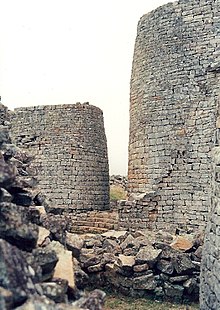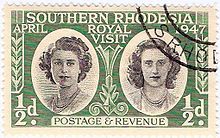History of Zimbabwe
In the 2000s Zimbabwe's economy began to deteriorate due to various factors, including the imposition of economic sanctions by Western countries led by the United Kingdom and widespread corruption in government.
[1] These Bantu speakers were the makers of early Iron Age pottery belonging to the Silver Leaves or Matola tradition, of the third to fifth centuries A.D.,[2] found in southeast Zimbabwe.
[7][8][9] Pottery belonging to a western stream of Bantu expansion (sometimes called Kalundu) has been found at sites in northeastern Zimbabwe, dating back to the seventh century.
It seems that the makers of the Ziwa/Gokomere wares were not the ancestral speakers of the Shona languages of today's Zimbabwe, who did not arrive in there until around the tenth century, from south of the Limpopo river, and whose ceramic culture belonged to the western stream.
Relying on centuries of military, political and religious development, the Rozvi (which means "destroyers") removed the Portuguese from the Zimbabwe plateau by force of arms.
The Rozvi continued the stone building traditions of the Zimbabwe and Mapungubwe kingdoms while adding guns to its arsenal and developing a professional army to protect its trade routes and conquests.
[citation needed] After losing their remaining South African lands in 1840, Mzilikazi and his tribe permanently settled the southwest of present-day Zimbabwe in what became known as Matabeleland, establishing Bulawayo as their capital.
In accordance with the terms of aforementioned concessions and treaties,[25] Cecil Rhodes promoted the immigration of white settlers into the region, as well as the establishment of mines, primarily to extract the diamond ores present.
Following the British victory over German forces in Southern Africa, many Rhodesian units, mostly white, were sent to the Western Front in Europe, where they took part in major battles of the war.
Lord Christopher Soames, the last Governor of Southern Rhodesia, watched as Charles, Prince of Wales, gave a farewell salute and the Rhodesian Signal Corps played "God Save the Queen".
The Constitution established two separate voters rolls, one for the black majority, who had 80% of the seats in Parliament, and the other for whites and other ethnic minorities, such as Coloureds, people of mixed race, and Asians, who held 20%.
On 12 August British government officials denied that they had not responded, saying Antony Duff, Deputy Governor of Salisbury, told Walls on 3 March that Thatcher would not annul the election.
It involved attacks on government personnel and installations, armed banditry aimed at disrupting security and economic life in the rural areas, and harassment of ZANU-PF members.
The pacification campaign, known as the Gukuruhundi, or strong wind, resulted in at least 20,000 civilian deaths perpetrated by an elite, North Korean-trained brigade, known in Zimbabwe as the Gukurahundi.
The judiciary and human rights advocates fiercely criticised the first amendments enacted in April 1991 because they restored corporal and capital punishment and denied recourse to the courts in cases of compulsory purchase of land by the government.
[48] Although many whites had left Zimbabwe after independence, mainly for neighbouring South Africa, those who remained continued to wield disproportionate control of some sectors of the economy, especially agriculture.
Growth, employment, wages, and social service spending contracted sharply, inflation did not improve, the deficit remained well above target, and many industrial firms, notably in textiles and footwear, closed in response to increased competition and high real interest rates.
In the months leading up to the poll, ZANU-PF, with the support of the army, security services, and especially the so-called 'war veterans', – very few of whom actually fought in the Second Chimurenga against the Smith regime in the 1970s – set about wholesale intimidation and suppression of the MDC-led opposition[citation needed].
[citation needed] Mugabe's political operatives were thus able to weaken the opposition internally and the security apparatus of the state was able to destabilise it externally by using violence in anti-Mugabe strongholds to prevent citizens from voting.
[63][64] The settlement of the Second Congo War brought back Zimbabwe's substantial military commitment, although some troops remain to secure the mining assets under their control.
It features mansions, manicured lawns, full shops with fully stocked shelves containing an abundance of fruit and vegetables, big cars and a golf club give is the home to President Mugabe's out-of-town retreat.
[66] Zimbabwe's bakeries shut down in October 2007 and supermarkets warned that they would have no bread for the foreseeable future due to collapse in wheat production after the seizure of white-owned farms.
[67] On 4 December 2007, The United States imposed travel sanctions against 38 people with ties to President Mugabe because they "played a central role in the regime's escalated human rights abuses.
One foreign reporter witnessed hundreds of children at Hatcliffe Extension Primary School in Epworth, 19 kilometres (12 miles) west of Harare, writing in the dust on the floor because they had no exercise books or pencils.
[72] After the first round, but before the counting was completed, Jose Marcos Barrica, the head of the Southern African Development Community observer mission, described the election as "a peaceful and credible expression of the will of the people of Zimbabwe."
With symbolic handshake and warm smiles at the Rainbow Towers hotel, in Harare, Mugabe and Tsvangirai signed the deal to end the violent political crisis.
[91][92] In November 2008 the Air Force of Zimbabwe was sent, after some police officers began refusing orders to shoot the illegal miners at Marange diamond fields.
In 2008 some Zimbabwean lawyers and opposition politicians from Mutare claimed that Shiri was the prime mover behind the military assaults on illegal diggers in the diamond mines in the east of Zimbabwe.
[93][96] In January 2009, Morgan Tsvangirai announced that he would do as the leaders across Africa had insisted and join a coalition government as prime minister with his nemesis, President Robert Mugabe .
[110] In January 2019 following a 130% increase in the price of fuel thousands of Zimbabweans protested and the government responded with a coordinated crackdown that resulted in hundreds of arrests and multiple deaths.



